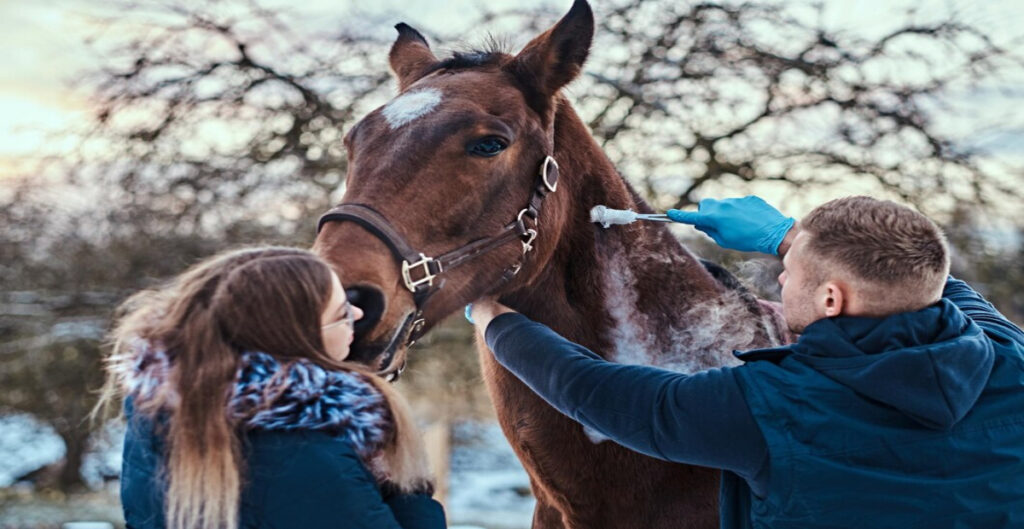
The beautiful horse requires exceptional care and attention. part of being a responsible owner is giving them that. Spending time with your horse and monitoring his overall health, even if it seems time-consuming, will extend his life and save you money on veterinary care.
The following are the fundamental criteria for horse care, per Agriculture Victoria:
Feed
Horses in good physical condition require access to an adequate amount of high-quality roughage (pasture, hay or chaff). One to two kilograms should be fed for every 100 kilograms of body weight. A horse that works frequently or whose body condition declines due to insufficient pasture may require additional feeding. In the paddock, provide a mineral block or salt lick. For recommendations on appropriate complementary foods, talk to your veterinarian. Grass clippings and a variety of food scraps are not suitable feed as they can make a horse sick.
Water
There must always be access to clean water. A self-filling trough or dam is ideal. If a bathtub is used, it should be checked daily and refilled as needed. Self-filling troughs and dams should also be inspected frequently. Because they tip over easily, buckets are not ideal as a permanent water supply. In general, a horse in hot conditions can consume 25-45 liters per day.
Refuge
Horses need protection from the sun, wind and rain. A walk-in shed or stable or a tree provides good cover. The horse can be protected from the cold with a waterproof rug, but should be checked daily to make sure it is not rubbing, slipping or leaking.
Exercise/space
An ample area is essential for horses to walk and run, unless they are exercised regularly. Horses should only be tethered for short periods, and proper tethering equipment, adequate feed and water, daily supervision and inspection, and level ground are all essential. Long-term tethering of horses is not permitted.
Paddocks
Fences must be kept in good condition to prevent damage and escape. To keep the horse safe, remove litter and weeds regularly. Be alert to avoid hazards such as frayed wire or wires such as nearby horses that could result in a horse being injured by a fence.
General health care

Teeth
Ένα άλογο που διατηρείται σε μάντρα πρέπει να εξετάζει τα δόντια του από κτηνίατρο τουλάχιστον μία φορά το χρόνο. Μπορούν να γίνουν αιχμηρά και να προκαλέσουν ενόχληση και τραυματισμό στο στόμα εάν αφεθούν χωρίς θεραπεία. Τουλάχιστον μία φορά κάθε τρεις έως έξι μήνες, τα άλογα ηλικίας κάτω των πέντε ετών ή εκείνα που τρέφονται με σιτηρά χρειάζονται οδοντιατρική εξέταση.
Legs
To keep the hooves from chipping or getting too long and painful for the horse, have a farrier trim them every 6 to 8 weeks. Shoes are only required if the horse is riding on rough or uneven ground.
Worm
Regular worming will help prevent worms from developing in your horse’s intestines and stomach. The use of several pickled worms is necessary every 6-8 weeks. Due to variations in dosage frequency and amounts, follow product instructions. Another easy technique to reduce pasture worm infestation is to minimize the amount of manure that accumulates in your horse’s paddock.
Vaccination
Your horse should receive vaccinations against viral respiratory diseases, tetanus and strangulation from a veterinarian. Your veterinarian will determine what and how often your horse should be vaccinated.
Health checks
Keep your horse from becoming overweight or underweight. If the horse’s ribs are visible, it is fragile. A large belly, round rump and crested neck indicate excess weight in the horse. The ribs should be felt rather than seen.
Frequent grooming will help your horse get used to handling and alert you to any changes in health. A veterinarian should also examine your horses regularly.
To ensure the health of their horse, horse owners find it beneficial to work with a qualified equine physician. Many of these vets belong to the Australian Veterinary Association’s special interest group, Equine Veterinarians Australia (EVA).
Veterinarians practicing equine medicine in Australia can become members of EVA, the country’s representative body for equine veterinarians. EVA advocates on behalf of its members to governments and equine industry associations, emphasizing that it will provide members with the assistance they need to continue to lead the industry in equine veterinary medicine.
EVA maintains close links with horse owners as well as equine organizations. Providing guidance and information to those who care for horses is vital to EVA’s mission to provide the best possible health and welfare for Australian horses.
Welcome!
The “Next Page” button will appear after 20 seconds.
